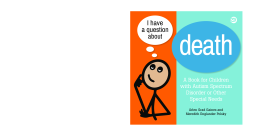
Additional Information
Book Details
Abstract
"What does it mean when someone dies?" "Why did someone I love have to die?" This book asks questions like these that a child might have about death before offering answers. It uses straightforward text and clear illustrations to explain what death means specifically to children with ASD and other Special Needs aged 5-11.
"I'm a kid who likes when there are answers to my questions." In this one sentence, Gaines and Polsky eloquently and succinctly sum up the reason why death and dying can be such hard concepts for children with ASD and social skills issues, as well as for kids who are just concrete thinkers. The authors have written a thoughtful, multi-faceted resource that allows children and parents to work through grief together. I Have a Question will help children understand not only what death and dying means, but also teach them that there's no one right reaction to it.
Amanda Morin, Writer/Expert at Understood.org and author of The Everything Parent's Guide to Special Education
In the wake of my husband's unexpected death, I searched for a book to help me talk about grief with my 8 year old son with Autism. I was surprised not to find anything to meet his needs - the books focused on much older people dying, or used metaphors that were beyond his reach. I Have a Question about Death is a book that every family should have on hand when they are experiencing the death of someone in their lives. It addresses the types of questions I got from both my sons (one with Autism and one 'neuro-typical') and answers them in a clear, concrete way. Our family would have benefited immensely from this invaluable resource and I'm thrilled it now exists to help others.
Benay Josselson, Mother of child with an Autism Spectrum Disorder
'I Have a Question about Death is a wonderful, practical resource to help children with Autism Spectrum Disorder and other special needs process grief and loss issues. It is especially important for guiding this specific population of young people that are concrete thinkers who may struggle with anxiety. I know it's appealing visual approach and clear language will be valuable tools for parents and professionals serving families with issues of bereavement.'
Linda Goldman, author of Great Answers to Difficult Questions About Death and Children Also Grieve
Arlen Grad Gaines is a licensed clinical social worker based in Maryland, USA. With a decade's experience in hospice work, she has developed a specialisation in supporting families who have children with special needs around the subject of death and dying.
Meredith Englander Polsky has been working in social work and special education for more than 15 years and lives in Maryland, USA. She founded Matan, Inc. (www.matankids.org) in 2000, which has helped improve Jewish education around special needs for tens of thousands of families.
There are few books explaining death to children with autism or other special needs, so this one fills a real gap... The book could be useful with neuro-typical children too, and in families where there are a mixture of special needs and neuro-typical children, it could prove invaluable. Bright and full of colour, it will provide solace and information in a beautifully produced book.
Healthy Books
healthybooks.org.uk
Table of Contents
| Section Title | Page | Action | Price |
|---|---|---|---|
| I Have a Question about Death – A Book for Children with Autism Spectrum Disorder or Other Special Needs by Arlen Grad Gaines and Meredith Englander Polsky | 5 | ||
| Acknowledgments | 8 | ||
| Preface | 9 | ||
| Story | 11 | ||
| “What does it mean when a person dies?” | 16 | ||
| “Why do people die?” | 17 | ||
| “Does it hurt to die?” | 18 | ||
| “What happens to people when they die?” | 20 | ||
| “But what about the person’s body?” | 21 | ||
| “When someone dies, what does it feel like for the people who are still alive?” | 22 | ||
| “What can I do when someone I love has died?” | 26 | ||
| “When someone I love has died, will I ever see them again?” | 27 | ||
| Short Picture Story: I Have a Question about Death | 31 | ||
| Suggestions for Parents and Caregivers | 39 |
